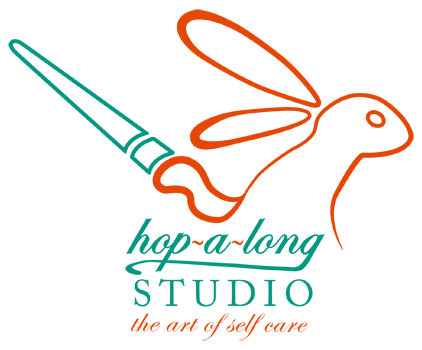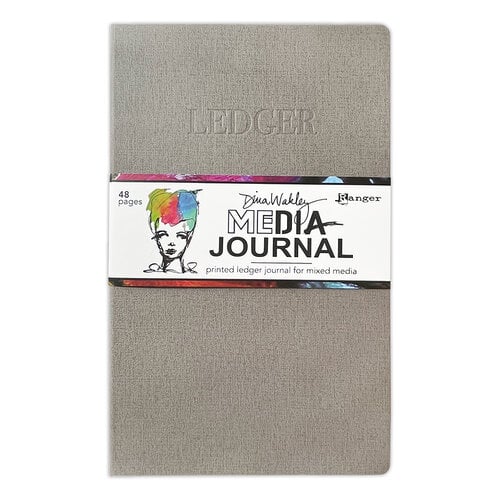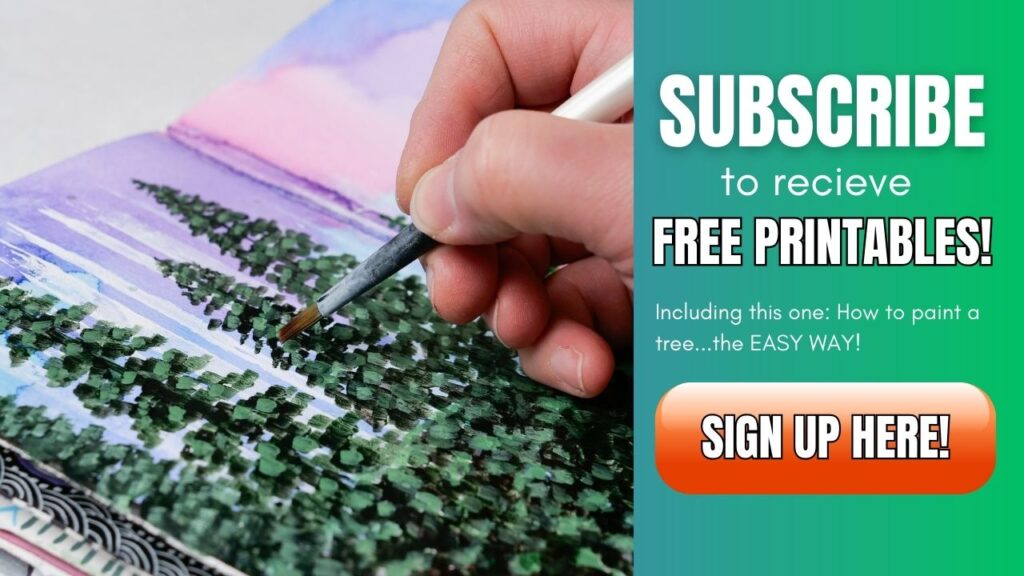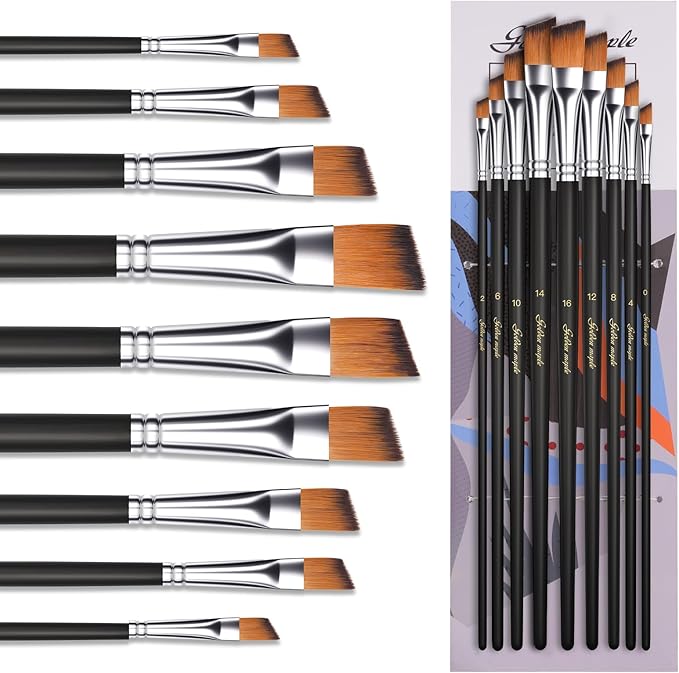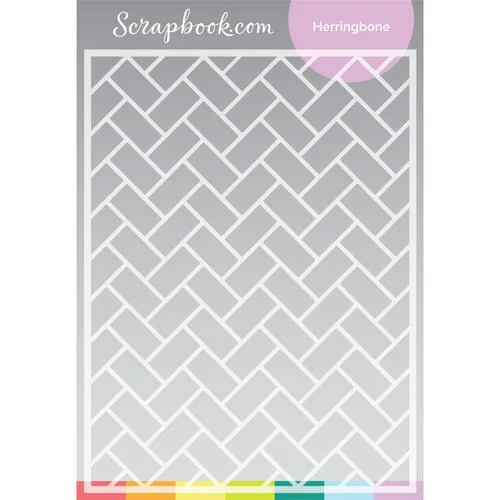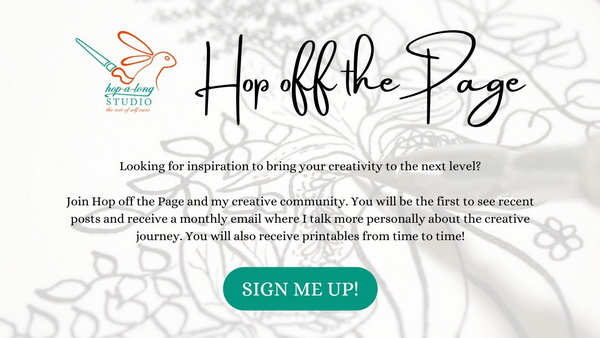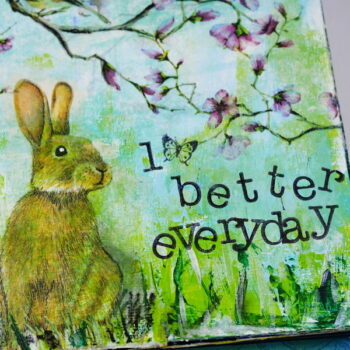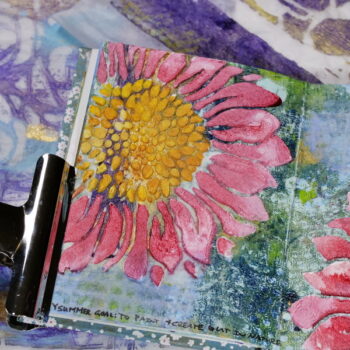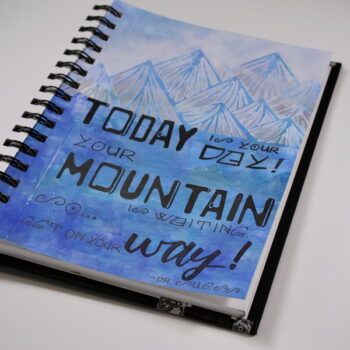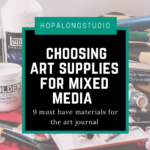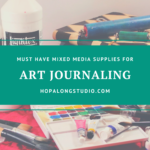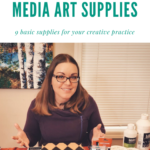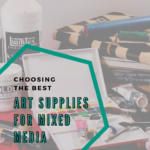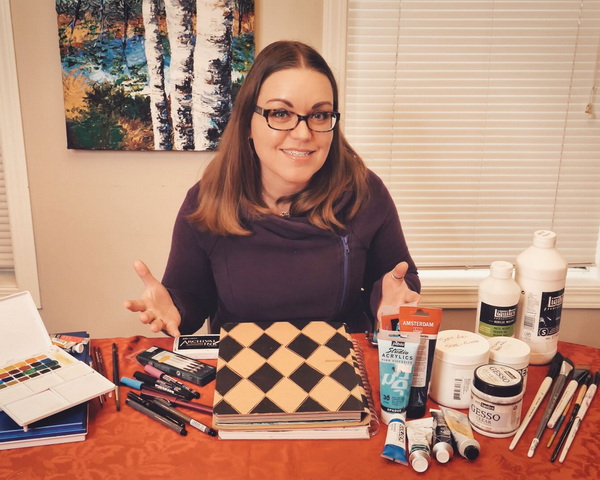
Must Have Mixed Media Supplies for the Art Journal
With Christmas just around the corner, I wanted to share with you the must have mixed media supplies for the art journal. Depending on what and how you like to create, your essential mixed media art supplies may be different. Here are my recommendations for mixed media supplies for the art journal.
Hop-A-Long Studio is reader-supported. When you buy through links on our site, we may earn an affiliate commission at no cost to you. Learn more.
Mixed Media Art Journal
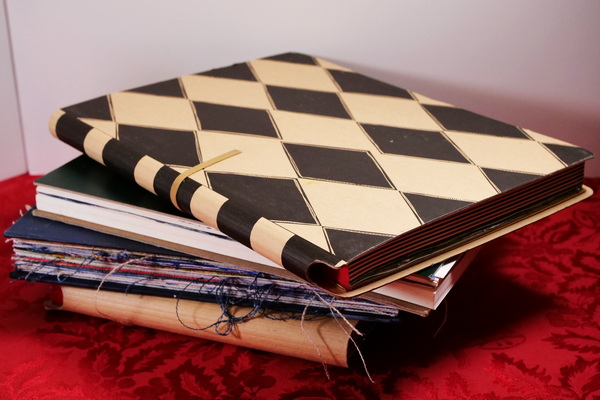
There are a variety of different journals that I use in my creative practice. When choosing a journal, I look for a journal with smooth paper that can take wet mediums without buckling.
The smoothness of the paper lets me write smoothly on the surface for sketching and drawing. It also allows me to use stamps on the surface and get clear images. As a mixed media artist, I want a book that can be used with water. This includes acrylic washes, watercolor paints, and other wet mediums. When a journal has both characteristics, it means that I will be able to use it for almost any project.
When starting out, there are three are journals that I can recommend. My favorite is the Pentalic Nature Sketch Multimedia Sketchbook. This coil bound sketchbook works so well with all mediums and even allows great blending of watercolor even though it is not a watercolor sketchbook.
If you are looking for a book that is more readily available at your local craft or scrapbooking store, I would suggest one of the Dylusions journals. This journal works well but has a bit more buckling with mediums than the Pentalic sketchbook. But the smooth paper works well for paints and inks.
Be aware with the Dylusions journals that watercolor absorbs straight into the surface. There is not the working time that you get with the Pentalic journal or a watercolor specific journal.
I always love the Dina Wakley Journals and my new favorite is the ledger journal. For a full review of this journal and the best mediums to use with it, visit this article: My First Impressions of the Dina Wakley Ledger Journal
The Dina Wakley Media Ledger Journal is a faithful reproduction of a 1920's hardware store ledger, perfect for mixed media artists.
When you need somewhere to create and preserve your artwork, look no further than this Dylusions Classics Journal from Ranger Ink, designed by Dyan Reaveley. This journal includes 52 double-sided pages, 28 mixed media, 12 black and 12 Kraft pages, all waiting for your inspiration.
- Nature sketch drawing book
- Made in the USA
- Can be used for wet or dry media
- Acid free with 25-percent cotton sheets
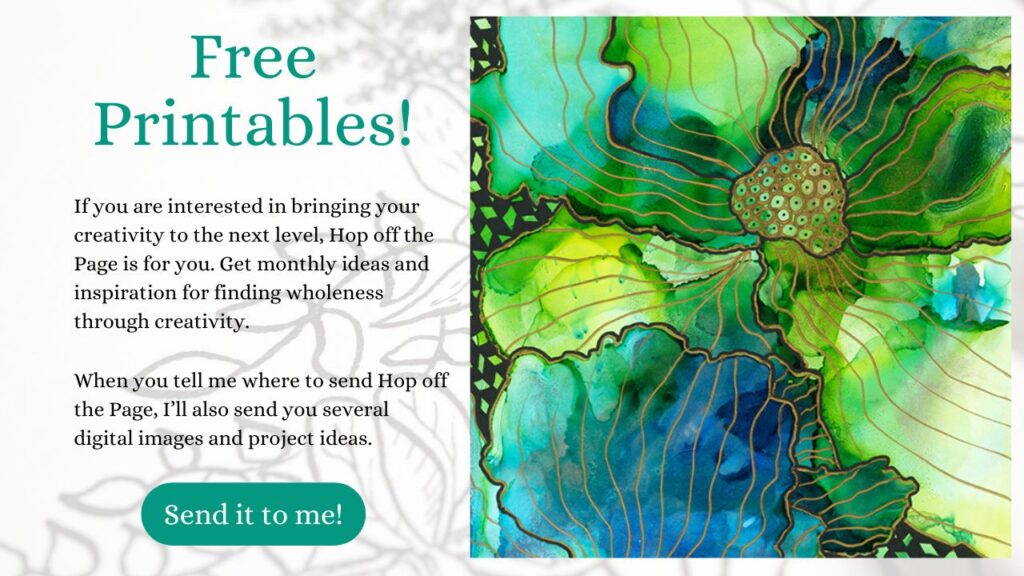
Art Pens
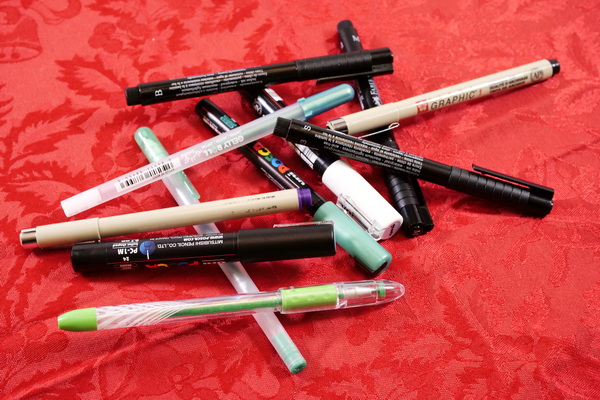
Art pens are a staple of my creative practice. Whether you are drawing, journaling, or adding highlights to your images, they are an essential part of an art journaling practice. There are a variety of pens including permanent pens, water soluble pens, gel pens, paint pens, fountain pens and brush pens.
Over the last few months, I have been sharing information about pens and which ones are my favorites. To see my review of paint pens, click here. For my overview of permanent fineliner pens, brush pens and fountain pens, click here.
If you are interested to find out which gel pens work the best on black paper, click here to see my article and samples.
Here is my list of favorite art pens:
- Permanent Fineliner: Sakura MicroPerm
- Permanent Brush Pen: Zebra P-WF1 Brush Pen Fine Point, Pentel Art Pocket Brush Pen
- Fountain Pens: Lamy Safari for water soluble ink, Platinum Plaisir with Carbon Ink Cartridges for permanent ink
- Water Soluble Pens: Tombow Dual Brush Pen
- Gel Pens: Pentel and Sakura Gelly Roll Pens
Every facet of fine-line detailing and permanence has been incorporated into the Microperm Pen by Sakura. For writing in micro-spaces or on unusual and challenging surfaces, the Microperm meets the challenge.
Create both thick and thin lines with Zebra Zensations Fude Brush Pens. These pens feature waterbased, water-resistance, archival pigment ink for a wide variety of techniques, including drawing, illustration, design, calligraphy, and hand lettering.
The Pentel Pocket Brush Pen is ideal for creating fine to broad lines with a single brushstroke. Portable and refillable with permanent pigment ink, it’s perfect for painting, cartooning, detailing, and much more.
- Iconic design with a sleek, modern update
- Ergonomic grip is comfortable and great for beginners
- Removable steel nib
- Ink window for easy monitoring
- Refillable with ink cartridge or converter and bottled ink
- Affordable entry-level pens with an elevated aluminum body
- Ultra-smooth, beginner-friendly steel nib
- Patented cap design keeps ink fresh
- Silky, scratch-resistant finish
Waterproof carbon ink cartridges for the Platinum Plaisir Fountain Pen.
- Versatile water-based colors
- Flexible brush tip and precise fine tip
- Easy blending with self-cleaning tips
- Odorless, non-bleed, acid-free ink
Similar to a technical pen, the Faber-Castell Pitt Artist pens are designed for precise and detailed work. They are ideal for sketching, studying, and inking.
Made with waterproof pigmented India ink, artwork won’t fade or bleed.
Acrylic Paint
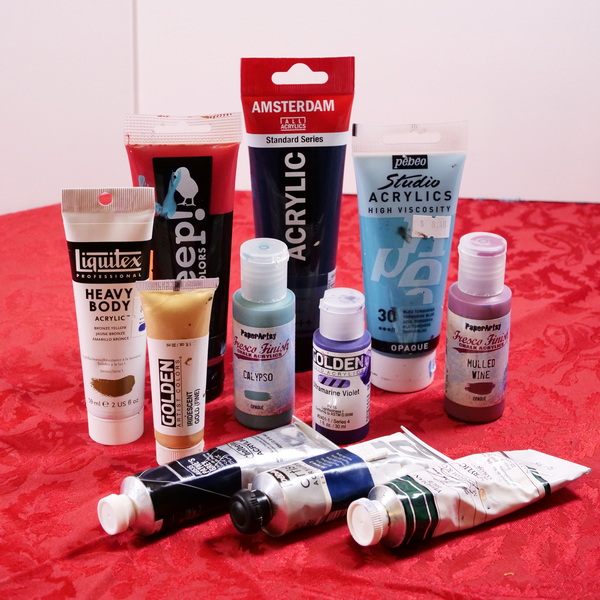
There are so many varieties of acrylic paint, and it can feel overwhelming to choose a paint. For art journaling I prefer a pigment-based paint for vibrant color and lightfastness. Most craft paint is dye-based which will work in a journal, but it is not my preferred option.
If you are new to paint, I would suggest using a student grade pigment paint. My favorite is the Pebeo Studio Acrylics as I like the texture of the paint, the opacity and color. I have also been using both Amsterdam and Cheep! Acrylic paints which work well in my journals.
If you are interested in more professional artists paints, my favorite is the Golden Artist Colors. They work beautifully but are quite expensive as this paint has a high pigment load. Other highly pigmented professional paints that I use include Holbein, M. Graham & Co, Winsor and Newton Galleria, and Pebeo Artist Acrylics ExtraFine.
Pebeo High Viscosity Studio Acrylic Paints are the ultimate mixed media acrylic! Vivid, deep, and richly pigmented, it offers very good lightfastness and permanence.
Proudly crafted in the Netherlands, these acrylic paints are value priced and easy to use, making them an excellent choice for the beginning or intermediate artist.
- Renowned professional quality
- Pure pigments in high concentrations
- 100% acrylic emulsion; no fillers, dyes, or opacifiers
- Highly lightfast and permanent
- Made in the USA
- Designed to add luster and brilliance to acrylic paintings
- Unique texture similar to fine oils- longer working time -superior covering
- Made in Japan
M. Graham puts the same care and attention to detail into acrylic paints that he lavishes on more traditional media. Each color is manufactured only in small batches, using a traditional three roller mill.
• Great quality at an affordable price
• Ideal for artists of all levels
• High pigment loads for quick, vibrant coverage
• Durable, water-resistant finish
- Extra fine artist acrylic is an innovative acrylic with a homogeneity that surpasses all others in viscosity, finish or hue between wet and dry color
- The intense colors feature homogeneity and harmonization of pigment strengths
- Versatile high viscosity paste for easy application with both brushes and painting knives
Watercolor Paints
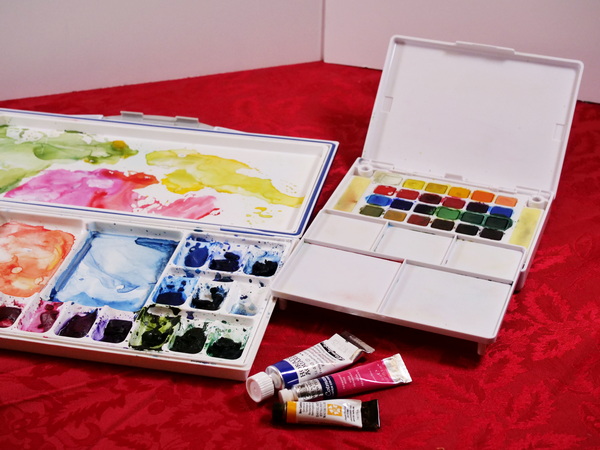
I love using watercolor paints in my projects. Watercolor works so well for background washes and for adding color to pen and ink images.
When choosing watercolor paint, even as a beginner, do not buy super cheap watercolor paint. I made that mistake early on in my mixed media practice. I hated the look and feel of the cheap watercolor paint and did not enjoy using it. Several years later I had the opportunity to use quality watercolor paints in a class and was very impressed on how they added to my creative projects.
Quality watercolor paints do not have to be extremely expensive. When you are starting out, I would suggest purchasing a set of pan watercolors as this is an economical way to try out a range of colors. My favorite travel set is the Sakura Koi Watercolor Field Sketch Box. This set of watercolors comes with everything you need to start watercolor painting. I still bring this set with me on every vacation so that I can sketch and watercolor from anywhere.
If you have been using watercolor for a while and want to create your own set, purchase a blank watercolor box and individual tubes of watercolor. If you are starting out, I would suggest the Winsor and Newton Cotman watercolors. They have beautiful pigments and for a student grade paint they work extremely well. I have a variety of student grade and professional grade watercolors that I like to use together in my creative projects.
- Compact, travel-ready watercolor pan sets
- Brilliant, smooth, pigmented colors
- Includes refillable Koi water brush and sponges
- Built-in mixing space for easy color blending
- Snap lid doubles as a postcard-sized easel
- Quality student-grade range
- 40+ colors, including modern and historic pigments
- Strong tint strength
- Reliable transparency and lightfastness
- Uniform consistency for beginners and students
- Includes 1 airtight watercolor palette with 18 wells for different paint colors and 2 large mixing areas.
- This paint tray palette has an airtight lid, which is excellent for keeping the paint pans moist and easy to clean. Keep your colors tidy and organized.
- Set of 10 colors hand-selected by artist Jean Haines
- Finely ground pigments blend beautifully and resist fading
- Includes 10, 5 ml (0.17 oz) tubes of Nickel Azo Yellow, Aussie Red Gold, Opera Pink, Quinacridone Magenta, Imperial Purple, Moonglow, Lunar Blue, Cascade Green, Green Apatite Genuine, and Undersea Green.
Brushes
When choosing brushes for acrylic and watercolor painting, there are several things to consider.
Watercolor Brushes
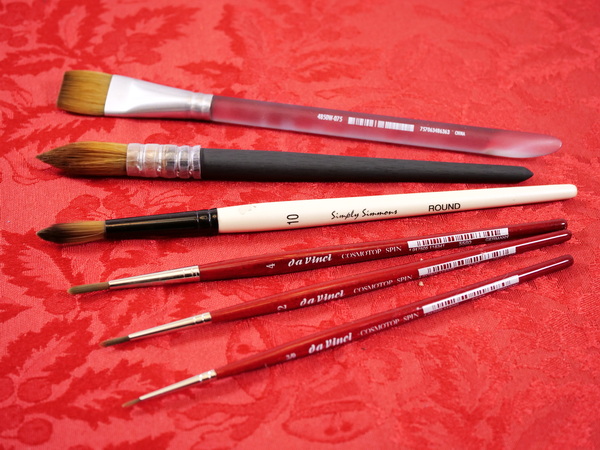
Choose a watercolor brush that is specific to watercolor painting. They are designed to hold a lot of water and work well with the watercolor pigments. When starting out you will most likely be using a brush with synthetic bristles. The natural hair watercolor brushes hold water better but can be 4 or 5 times the price of the synthetic brushes. A variety of sizes when using watercolor is ideal. I have a variety of brush sizes from 000 up to much larger wash brushes.
The majority of my brushes are daVinci Cosmotop Spin brushes but I also have brushes from Princeton and quill brushes from daVinci that I enjoy using.
- Superior synthetic Kolinsky hair
- Maximum water-holding capacity
- Fine points and tapered edges for precise detailing
- Versatile brushes for all media
- Long-lasting synthetic filaments
- Lacquered brush handle
- Made by hand in Germany
Da Vinci Petit Gris Pur Blue Squirrel Brushes are significantly longer and larger than other brands, and are ideal for mop and wash techniques, for priming, and for area work. The majority of the brush shapes in the line are made from pure Blue Squirrel hair.
Acrylic Brushes
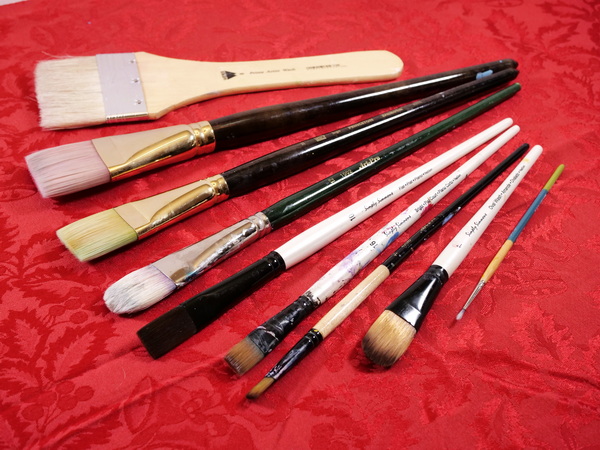
When choosing an acrylic brush for art journaling, I would suggest purchasing a 1.5” brush, 1” brush and some other smaller brushes. I prefer a square brush for overall painting and use small round brushes for details. Acrylic brushes do see a lot of wear and tear, so I tend towards cheaper brushes (less that $30). My favorite budget acrylic brush is the Simply Simmons and Golden Maple brushes. These brushes are easy to clean, wear very well and are enjoyable to paint with.
This angled paint brushes set includes 9 sizes (0,2,4,6,8,10,12,14,16) for achieving optimal painting results. Crafted for durability, these acrylic paint brushes deliver smooth strokes and precise color control. The resilient filaments hold paint effectively and release it evenly for seamless application.
Simmons brushes include a mixture of handmade brushes with natural bristles in an interlocking construction and synthetic brushes with larger diameter filaments to provide stronger spring and snap.
Princeton Dakota Series 6300 Synthetic Hair Brushes have long handles for maximum control, and synthetic bristles with excellent stiffness, snap, and shape retention. Easier to clean than natural bristle brushes, they are recommended for use with heavier paints.
• For oil and acrylic paints
• Super stiff synthetic bristles
• Long and short varnished wood handles
• Flat, seamless, matte-black ferrules
Gesso
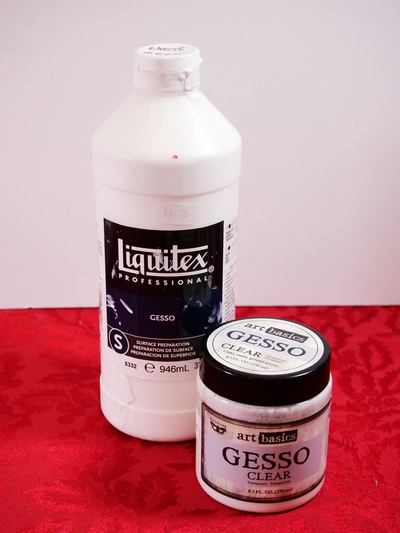
I use white gesso in both my canvas projects and art journals. Gesso is used to prep the pages in my art journal that I will be adding acrylic paint to. Gesso provides tooth for the paint to have a surface to stick to. It also prevents the paint from being absorbed into the paper or canvas, so you will end up using less paint on your paintings.
I also use it to create washes and in place of white paint on my projects. Especially if I am looking for a strong, opaque white on my art journal pages.
I use both Golden and Liquitex Gesso but my favorite brand is the Golden gesso. The Liquitex gesso has a strong smell that lingers for a while after being applied to the page.
Liquitex Basics Acrylic Gesso is formulated to produce a smooth, absorbent, finely textured ground for painting on most porous surfaces, including canvas, paper, fabric, wood, or plaster.
Golden Acrylic Gesso is a ready-to-use liquid ground formulated for the use of acrylics on any commonly used painting surface. It’s flexible and can be applied in thin layers to conform to a variety of textured surfaces without cracking.
Gel and Matte Mediums
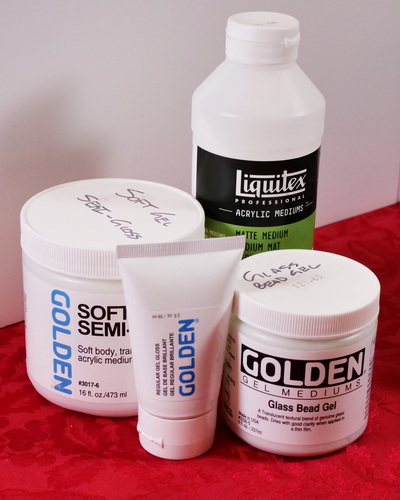
Gel mediums are used on my projects for decoupage and collage. The gel works well as an adhesive glue and can also be used as a topcoat or isolation layer in mixed media projects.
Matte medium is a thinner variation of gel medium. I use matte medium for adhering napkins, rice paper, tissue paper and thinner materials to my art journal pages. This medium is available in both gloss and matte. Please note that gel medium should not be thinned out with water to work like matte medium.
I use both Golden and Liquitex gels and matte mediums in my projects. There are other more economical versions available, but as these gels and mediums last quite a while, I like using artist quality mediums on my canvases and in my journals.
To see a fun and unique project using both gels and pastes, check out this article: Create the Ultimate Textured Collage with this Technique
Creates a matte, non-reflecting finish when added to acrylic colors. Lightweight, non-toxic; Opaque when wet, translucent when dry.
Regular Gel Semi-Gloss is a translucent medium with a consistency similar to Heavy Body paints. Use for extending colors, altering sheen, increasing translucency and adhering collage elements.
A coarse textured medium with a heavy body viscosity that holds peaks. Made with genuine glass beads to create a unique visual effect.
Use Golden Molding Paste Mediums to add textured relief to paintings. Mix them with acrylic mediums and paints, such as Golden acrylics, to create thick impasto layers. This modeling paste is water based, non-toxic, and formulated with 100% acrylic polymer emulsions.
Liquitex Modeling Paste is a thick, clay-like putty formulated with an acrylic polymer base and marble dust. Use alone or combine with acrylic colors to build forms and structures on rigid substrates.
Stencils, Stamps and Ink
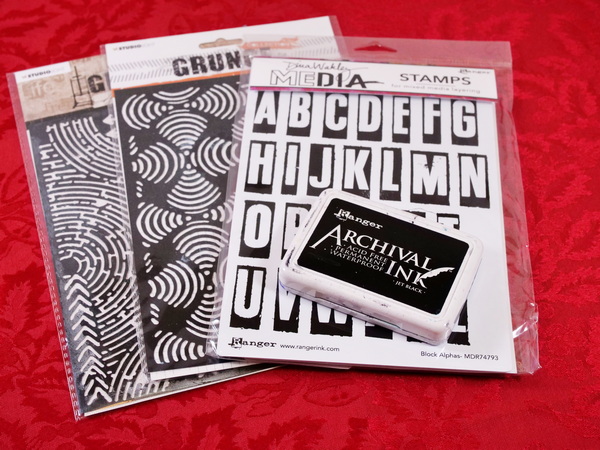
Stencils and stamps are an easy way of adding texture and creating focal images on your art journal pages. It is a great way of creating quickly on days where you might not be interested in spending the time to draw your own images.
When using stamps on mixed media projects, I find archival ink works well on a variety of surfaces. The archival ink is waterproof and will stick to slick and uneven surfaces.
The Jet Black Archival Ink Pad by Ranger Ink is acid-free, non-toxic, water-resistant, and fade-resistant, and provides lasting results. This ink will not deteriorate paper and does not bleed when inks, paints, or markers are used over it.
Package contains one 12" by 12" stencil for use on all your mixed media projects!
Package contains 1 piece stencil - 12x12 Inch. Material: Translucent 10mil Mylar PET.
This layering stencil will add beautiful design and texture to any mixed media project. This package contains one 4.125 x 8.5 inch stencil
Add depth, design, and amazing patterns to your projects with Scrapbook.com's exclusive Stencils Collection! This high quality reusable stencil is ready to be inked, painted, misted, and moussed to create unbelievable texture and interest on your layout pages, cards, home decor and more!
Create a beautiful and unique altered art project with the Ledger Script Cling Mounted Rubber Stamp Set by Tim Holtz for Stampers Anonymous. This stamp set comes on a three-hole punched storage sheet.
This five piece cling mounted rubber stamp set, Fly High, is designed by Dina Wakley for Ranger Ink. This stamp set features five birds flying through the air. These stamps are perfect for mixed media layering
Brayer
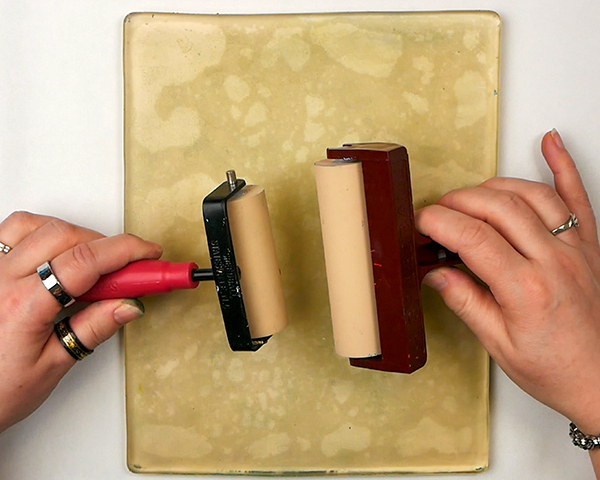
I love using a brayer in my mixed media practice. I use brayers when Gelli printing and it’s a great way of adding paint quickly to an art journal page. The brayer gives different texture than a brush, so it is a fun way of quickly adding color to your journal.
My recommended brayer for gel plate printing. 4" brayer provides even ink distribution and maximum coverage. Allows for consistent prints on a variety of surfaces.
Questions?

Are any of these mixed media art supplies part of your mixed media practice? I would love to know what you are using for creating and would love to hear any questions you may have. Please leave a comment below or contact me directly.
If you are looking for more mixed media ideas and inspiration, sign up for Hop off the Page and join my creative community. You will be the first to see my most recent posts, get free digital images, and get weekly inspiration!


